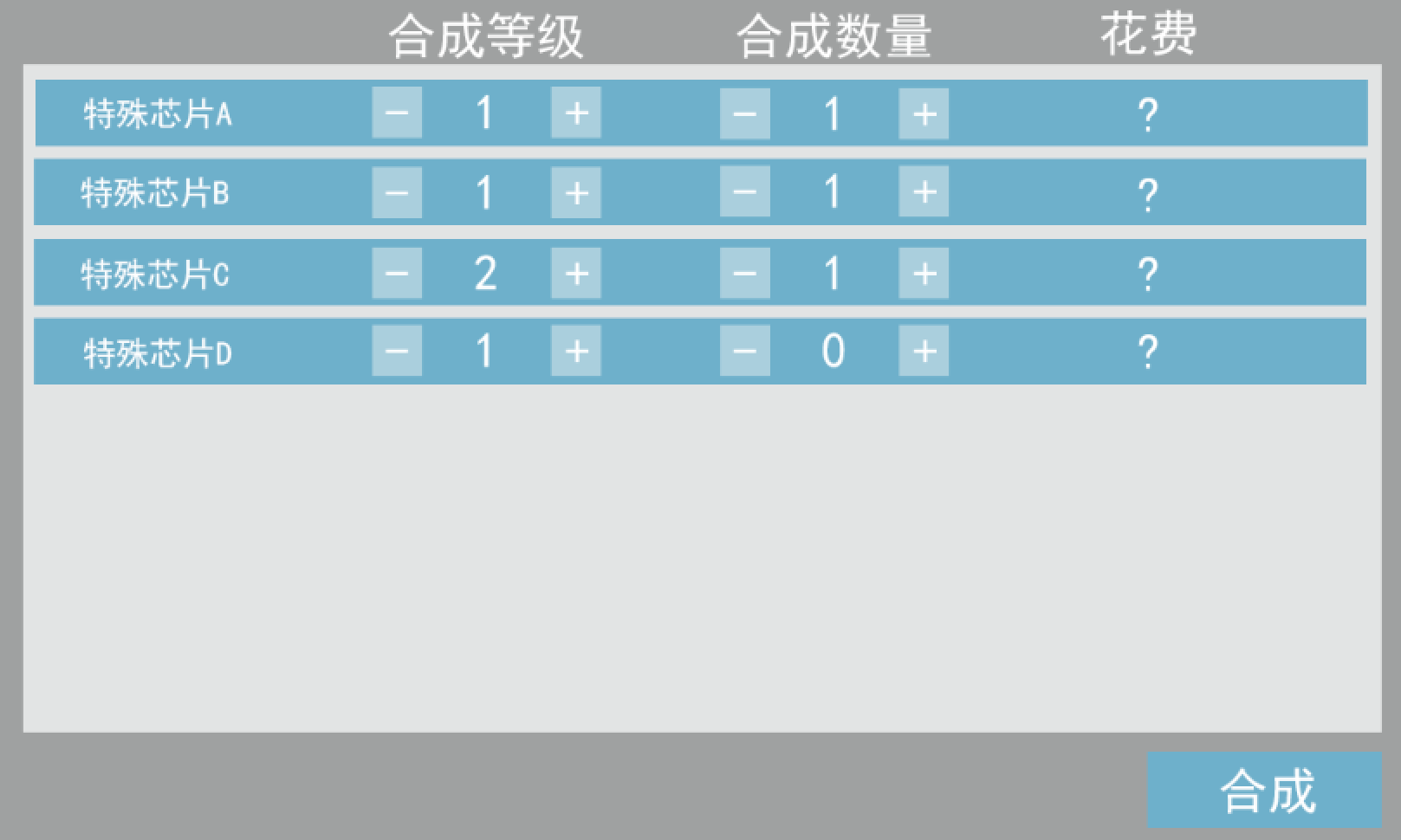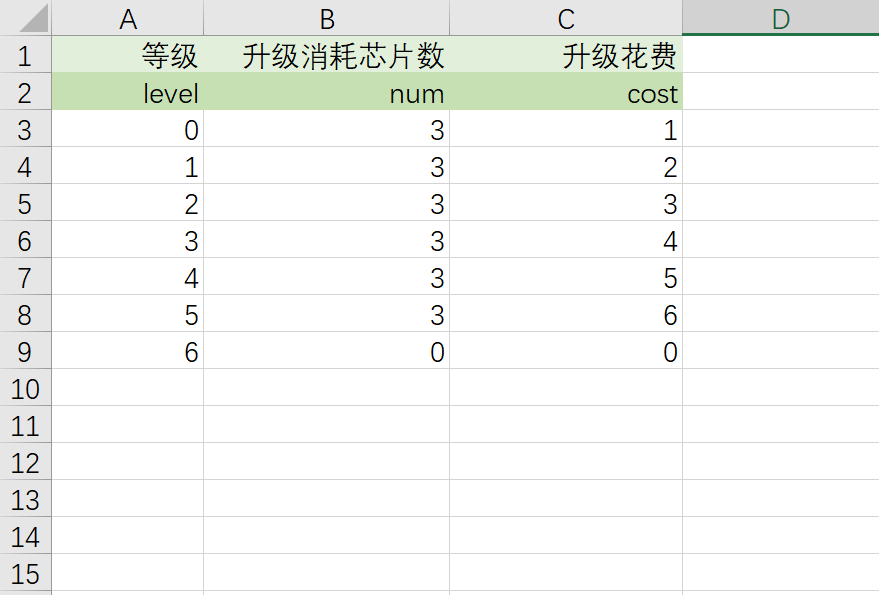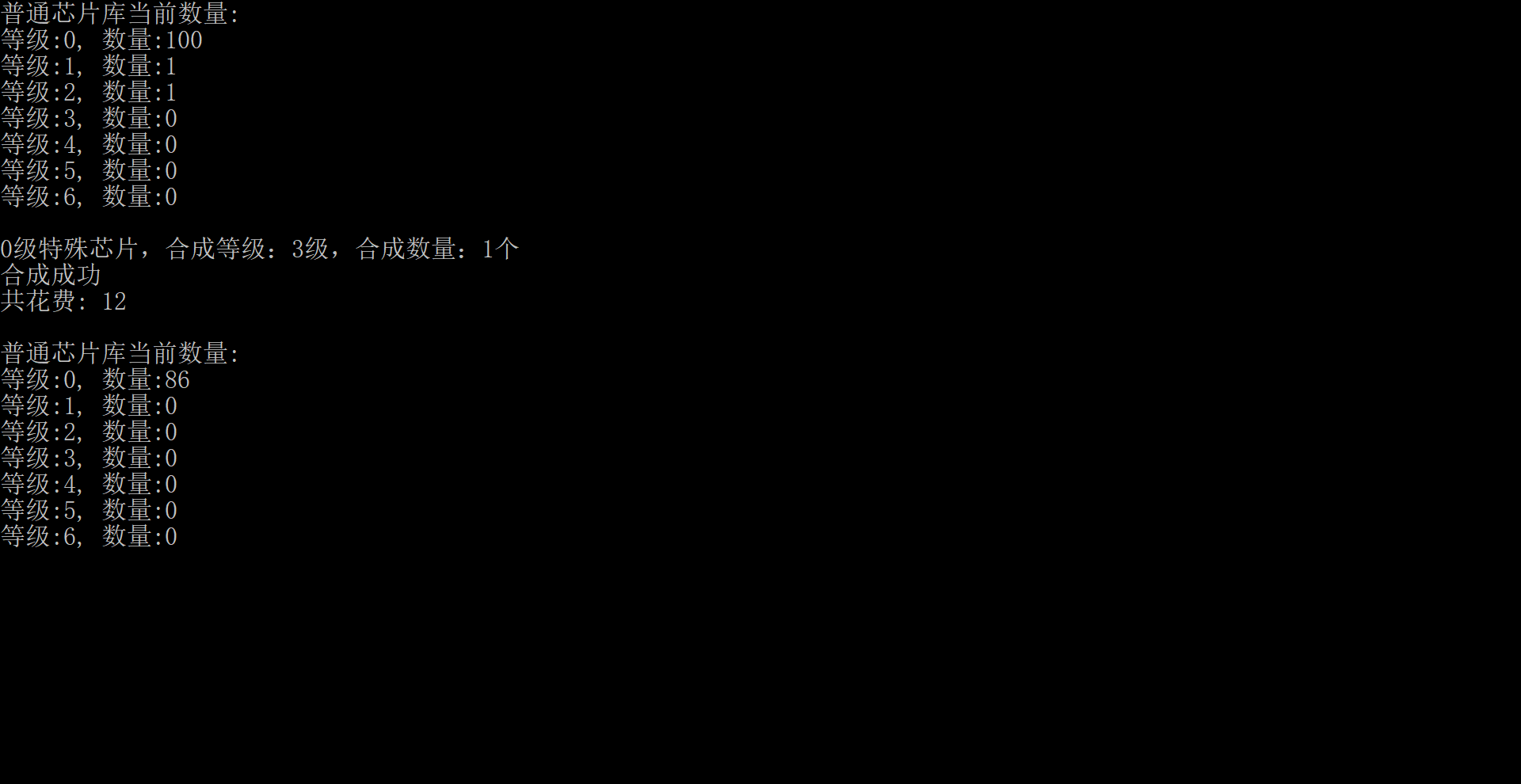

要求
- 现有一堆特殊芯片和普通芯片,芯片等级分为0-6级,芯片都可以合成升级,普通芯片和特殊芯片升级都消耗一定钱数和同等级普通芯片数。配置表如上,比如:升级一个0级特殊芯片到1级,需要消耗自身和2个0级普通芯片共3个芯片,花费为1;升级一个1级普通芯片到2级,需要消耗自身和2个1级普通芯片共3个芯片,花费为2。这里只讨论升级特殊芯片。要求实现设计图所示所有功能。
实现思路
- 首先把特殊芯片和普通芯片分类,因为6级已是满级无法再升级,所以特殊芯片中再去除6级芯片,剩下的特殊芯片都是有可能升级的芯片。
- “合成等级”默认比芯片自身高一级,最低比芯片自身高一级,最高为6级。
- “合成数量” 默认为1,实际数量多少后面程序会修正。
- 根据前面的“合成等级”和“合成数量”,再计算出“花费”具体数。
- 界面初始化时,程序会计算所有特殊芯片的“合成等级”和“合成数量”,如果某芯片无法升级,会修正该芯片“合成数量”为0,“花费”为0。
- 点击某芯片“合成等级”或“合成数量”加减按钮,该芯片前的所有芯片“合成等级”、“合成数量”数不变,而它后面所有芯片的“合成等级”不变,“合成数量”数需要程序修正,如果仍可升级则不变,否则数量减1尝试升级,如果仍不能升级则继续减1尝试,直至数量为0。例如,可升级特殊芯片依次为A、B、C、D,将B的“合成数量”加1,A的“合成等级”、“合成数量”数不动,C、D的“合成等级”不动、“合成数量”程序修正。
讨论重点
- 这里主要讨论:在普通芯片数量有限的前提下,特殊芯片的升级消耗普通芯片数量算法和花费算法。
- 测试用例:普通芯片消耗库有100个0级普通芯片,1个1级普通芯片,1个2级普通芯片。现有1个0级特殊芯片,尝试合成等级为3级,合成数量为1。
- 首先,初始化配置表和普通芯片消耗库,这里用Dictionary<int, int>简单实现。cfg_num的key为等级,value为消耗芯片数;cfg_cost的key为等级,value为花费。
Dictionary<int, int> cfg_num = new Dictionary<int, int>(); Dictionary<int, int> cfg_cost = new Dictionary<int, int>(); Dictionary<int, int> expDic = new Dictionary<int, int>(); public void InitCfg() { // 所需消耗数量配置 cfg_num = new Dictionary<int, int>(); cfg_num[0] = 3; cfg_num[1] = 3; cfg_num[2] = 3; cfg_num[3] = 3; cfg_num[4] = 3; cfg_num[5] = 3; cfg_num[6] = 0; // 花费配置 cfg_cost = new Dictionary<int, int>(); cfg_cost[0] = 1; cfg_cost[1] = 2; cfg_cost[2] = 3; cfg_cost[3] = 4; cfg_cost[4] = 5; cfg_cost[5] = 6; cfg_cost[6] = 0; } // 初始化普通芯片消耗库 public void InitExpDic() { expDic[0] = 100; expDic[1] = 1; expDic[2] = 1; expDic[3] = 0; expDic[4] = 0; expDic[5] = 0; expDic[6] = 0; // 6级普通芯片数目肯定是0 }
- 将要求合成等级的特殊芯片全部转化为0级芯片,得到所要消耗0级芯片总数即“总消耗”。将初始特殊芯片自身全部转化为0级芯片,普通芯片消耗库符合部分也全部转化为0级芯片,两者相加得到“总拥有”。当总拥有 >= 总消耗,即可升级。
public bool CanUp(int needLv, int needNum, int itsLv) { if (needLv == 0 || needNum == 0) { return true; } // 总消耗 Dictionary<int, int> costDic = new Dictionary<int, int>(); for (int i = 0; i <= 6; i++) { costDic[i] = 0; } costDic[needLv] = needNum; // 总拥有 = 普通芯片消耗库符合部分 + 自身 Dictionary<int, int> gotDic = new Dictionary<int, int>(); for (int i = 0; i <= 6; i++) { gotDic[i] = expDic[i]; } gotDic[itsLv] += 1; int costZeroNum = GetZeroNum(costDic, needLv, 0); int gotZeroNum = GetZeroNum(gotDic, needLv - 1, 0); return gotZeroNum >= costZeroNum; } public int GetExpDicZeroSum() { return GetZeroNum(expDic, 6, 0); } // 从level开始往前,所有芯片都转换成0级普通芯片 public int GetZeroNum(Dictionary<int, int> dic, int level, int extraNum) { if (level == 0) { return dic[0] + extraNum; } int num = (dic[level] + extraNum) * cfg_num[level - 1]; return GetZeroNum(dic, level - 1, num); }
- 花费算法如下,因为该算法会真正扣去普通芯片库的相关数量,所以需要确定特殊芯片能升级再使用。
// 能升级再算花费 public int ApplyCost(Dictionary<int, int> expDic, int needLv, int needNum, int itsLv) { if (needNum <= 0 || needLv == 0) { return 0; } int cost = needNum * cfg_cost[needLv - 1]; int num = cfg_num[needLv - 1]; if (itsLv == needLv - 1) { num -= 1; } int leftNum = needNum * cfg_num[needLv - 1] - expDic[needLv - 1]; if (itsLv == needLv - 1) { leftNum -= 1; } if (leftNum > 0) { expDic[needLv - 1] = 0; } else { expDic[needLv - 1] = Math.Abs(leftNum); } cost += ApplyCost(expDic, needLv - 1, leftNum, itsLv); return cost; }
- 测试用例如下
public void Test() { InitCfg(); InitExpDic(); PrintExpDic(); Console.WriteLine(); int itsLv = 0; int needLv = 3; int needNum = 1; Console.WriteLine("{0}级特殊芯片,合成等级:{1}级,合成数量:{2}个", itsLv, needLv, needNum); if (CanUp(needLv, needNum, itsLv)) { Console.WriteLine("合成成功"); int cost = ApplyCost(expDic, needLv, needNum, itsLv); Console.WriteLine("共花费: {0}", cost); PrintExpDic(); } else { Console.WriteLine("合成失败"); } }
- 得到打印如下,“1个0级特殊芯片,尝试合成等级为3级,合成数量为1”,需要14个0级普通芯片,1个1级芯片,1个2级普通芯片。

- 全部代码如下
using System; using System.Collections.Generic; namespace CanDDel { public class Solution { Dictionary<int, int> cfg_num = new Dictionary<int, int>(); Dictionary<int, int> cfg_cost = new Dictionary<int, int>(); Dictionary<int, int> expDic = new Dictionary<int, int>(); public void Test() { InitCfg(); InitExpDic(); PrintExpDic(); Console.WriteLine(); int itsLv = 0; int needLv = 3; int needNum = 1; Console.WriteLine("{0}级特殊芯片,合成等级:{1}级,合成数量:{2}个", itsLv, needLv, needNum); if (CanUp(needLv, needNum, itsLv)) { Console.WriteLine("合成成功"); int cost = ApplyCost(expDic, needLv, needNum, itsLv); Console.WriteLine("共花费: {0}", cost); Console.WriteLine(); PrintExpDic(); } else { Console.WriteLine("合成失败"); } } public void InitCfg() { // 所需消耗数量配置 cfg_num = new Dictionary<int, int>(); cfg_num[0] = 3; cfg_num[1] = 3; cfg_num[2] = 3; cfg_num[3] = 3; cfg_num[4] = 3; cfg_num[5] = 3; cfg_num[6] = 0; // 花费配置 cfg_cost = new Dictionary<int, int>(); cfg_cost[0] = 1; cfg_cost[1] = 2; cfg_cost[2] = 3; cfg_cost[3] = 4; cfg_cost[4] = 5; cfg_cost[5] = 6; cfg_cost[6] = 0; } // 初始化普通芯片消耗库 public void InitExpDic() { expDic[0] = 100; expDic[1] = 1; expDic[2] = 1; expDic[3] = 0; expDic[4] = 0; expDic[5] = 0; expDic[6] = 0; // 6级普通芯片数目肯定是0 } public bool CanUp(int needLv, int needNum, int itsLv) { if (needLv == 0 || needNum == 0) { return true; } // 总消耗 Dictionary<int, int> costDic = new Dictionary<int, int>(); for (int i = 0; i <= 6; i++) { costDic[i] = 0; } costDic[needLv] = needNum; // 总拥有 = 普通芯片消耗库 + 自身 Dictionary<int, int> gotDic = new Dictionary<int, int>(); for (int i = 0; i <= 6; i++) { gotDic[i] = expDic[i]; } gotDic[itsLv] += 1; int costZeroNum = GetZeroNum(costDic, needLv, 0); int gotZeroNum = GetZeroNum(gotDic, needLv, 0); return gotZeroNum >= costZeroNum; } public int GetExpDicZeroSum() { return GetZeroNum(expDic, 6, 0); } // 从level开始往前,所有芯片都转换成0级普通芯片 public int GetZeroNum(Dictionary<int, int> dic, int level, int extraNum) { if (level == 0) { return dic[0] + extraNum; } int num = (dic[level] + extraNum) * cfg_num[level - 1]; return GetZeroNum(dic, level - 1, num); } // 能升级再算花费 public int ApplyCost(Dictionary<int, int> expDic, int needLv, int needNum, int itsLv) { if (needNum <= 0 || needLv == 0) { return 0; } int cost = needNum * cfg_cost[needLv - 1]; int num = cfg_num[needLv - 1]; if (itsLv == needLv - 1) { num -= 1; } int leftNum = needNum * cfg_num[needLv - 1] - expDic[needLv - 1]; if (itsLv == needLv - 1) { leftNum -= 1; } if (leftNum > 0) { expDic[needLv - 1] = 0; } else { expDic[needLv - 1] = Math.Abs(leftNum); } cost += ApplyCost(expDic, needLv - 1, leftNum, itsLv); return cost; } public void PrintExpDic() { Console.WriteLine("普通芯片库当前数量:"); foreach (KeyValuePair<int, int> item in expDic) { Console.WriteLine("等级:{0}, 数量:{1}", item.Key, item.Value); } } } }



